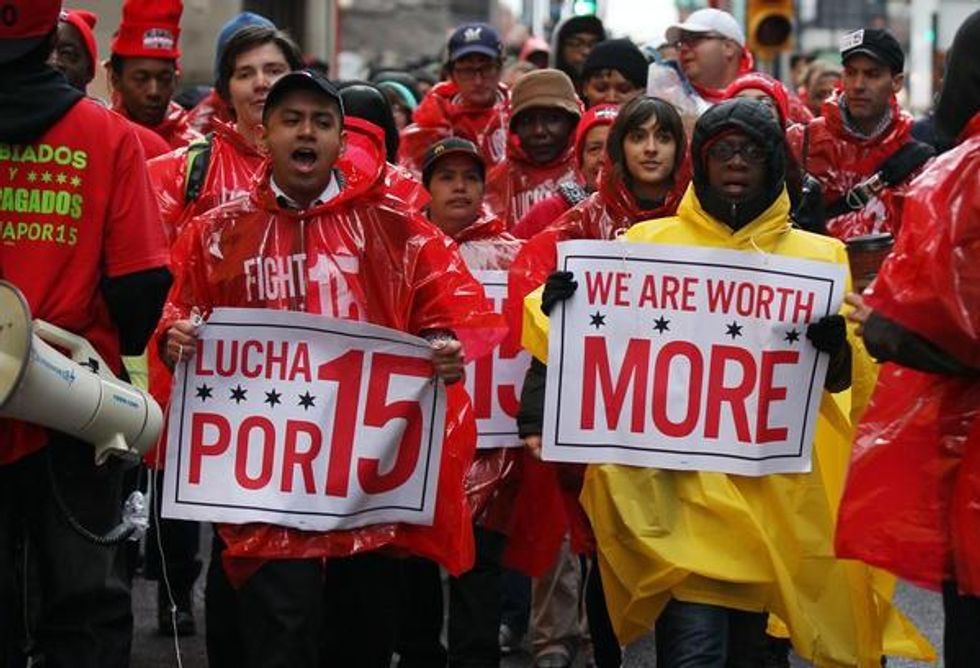If you're currently making the federal minimum hourly wage of $7.25 an hour, an increase to $10.10 would likely be a welcome development. But economists, labor advocates, and low-wage
workers themselves say that, in reality, such an increase is actually insufficient to adequately address the economic injustice that has taken hold in the United States over the last several generations.
On Tuesday night, President Obama used his State of the Union address to call for the $10.10 hike nationwide--and though welcomed by many as a step in the right direction--a secondary call is ringing out that says: Progress? Yes. Enough? Not nearly.
As the speech unfolded, the advocacy group Fight For Fifteen used its Twitter feed to elevate the voices of low-wage workers nationwide:
According to financial expert and Pulitzer Prize-winning journalist David Cay Johnston, Obama's executive order to increase wages for federal contract workers--which Obama vowed to do by executive order--will do little to combat the nation's overall and soaring inequality. A bill in Congress, which Obama also supports, would see this same wage apply to all workers.
Asked by the Real News Network if Obama's $10.10 increase for contract federal employees is enough to begin a reversal of the growing income gap, Johnston said, "No, not even close."
"It's important that we restore the minimum wage," he added. "We're not talking about raising it. We're talking about restoring it. Back in the mid '60s, it was almost $11 an hour."
According to analysis by the Center for Economic and Policy Research, if the minimum wage had kept up with productivity gains since 1968, it would now be $21.72.
And filmmaker Michael Moore went further back in history to make the case that a wage of $10.10 should be seen as paltry compared to what Henry Ford did for his workers exactly one hundred years ago this month.
As NPR reported on the history of the famous automaker this week:
January 1914 was a frigid month in Detroit -- much like January 2014 has been, but nonetheless thousands lined up in the bitter cold outside to take Henry Ford up : $5 a day, for eight hours of work in a bustling factory.
That was more than double the average factory wage at that time, and for U.S. workers it was one of the defining moments of the 20th century. Five dollars in 1914 translates to roughly $120 in today's money.
Riffing on that story, Moore took to his blog ahead of Tuesday night's State of the Union address to say:
That's right - in a much poorer America, one without TV, radio, phones or House of Cards on demand, Ford could afford it. In fact, Ford later said, he couldn't afford not to: "The owner, the employees, and the buying public are all one and the same, and unless an industry can so manage itself as to keep wages high and prices low it destroys itself, for otherwise it limits the number of its customers. One's own employees ought to be one's own best customers."
Tell THAT to anyone who says we can't afford a minimum wage of $15 here in 2014 - 100 years later, in a country about eight times as rich per person. The CEOs will scream and weep now just like they did then, and just like then they'll be wrong. Not only would it not destroy American businesses, it might be the only thing that can save them.
_________________________




